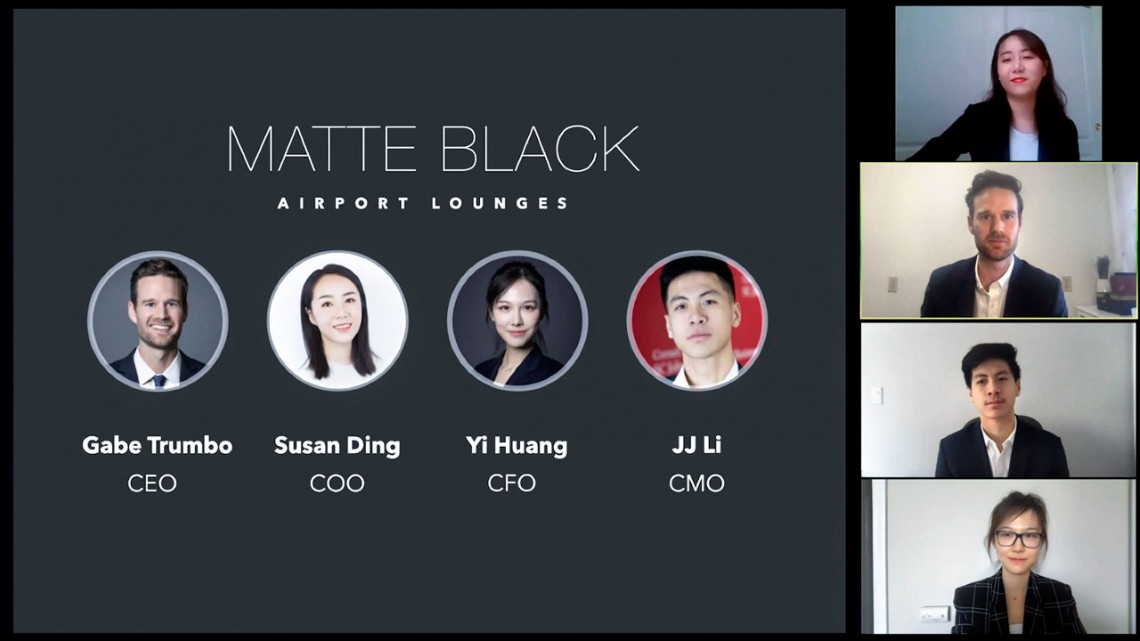
Matte Black Lounges, a team proposing to develop lounges at midsize U.S. airports, won the $25,000 first prize at this year's Hospitality Business Plan Competition hosted by the School of Hotel Administration's Pillsbury Institute for Hospitality Entrepreneurship.
Airport lounge idea wins hospitality business plan competition
By James Dean
Gabe Trumbo, MBA ’21, was dreading the downtime before his flight out of a small airport in Croatia last year. To his surprise, an airport lounge made the experience enjoyable, offering comfortable leather chairs, privacy and a refuge from blaring terminal announcements.
“You’re able to get a sense of space and relaxation, two things that are almost never associated with air travel,” Trumbo said of similar lounges in smaller airports across Europe.
Returning home, he wondered why such services were so rare in the U.S. The question led Trumbo to found Matte Black Lounges, a company that aims to fill a void of quality lounges at midsize U.S. airports.
Trumbo's startup won the $25,000 first prize in the 10th annual Cornell Hospitality Business Plan Competition hosted April 17 by the School of Hotel Administration’s Pillsbury Institute for Hospitality Entrepreneurship.
The Matte Black team – also including Shucen “Susan” Ding, MMH ’20, Yi Xuan Huang ’20 and Lyon “J.J.” Li ’23 – was one of five finalists that presented business plans to a panel of judges, culminating a competition that started last fall with more than 30 entrants.
Due to the coronavirus pandemic, the 10-minute presentations were made on Zoom rather than before a Statler Hall audience, and they were not followed by the traditional Hotel Ezra Cornell weekend gala dinner. But the virtual event unfolded smoothly with students participating from across the country, including California and Hawaii, and as far away as India and Singapore.
Organizers, judges and students said the competition provides hospitality entrepreneurs with a valuable real-life and hands-on learning experience.
“Through all phases of the competition, we’re helping students learn about developing ideas, researching opportunities and understanding markets,” said Adam Walden, a Hotel School lecturer in management communication and faculty co-chair of the program. “It’s a bonus when these great ideas take off and become viable businesses, and we have high hopes for this year’s teams.”
“For entrepreneurs, it’s not enough just to have a great invention and identify a market need,” added Sandy Solmon, founder and CEO of Sweet Street Desserts, one of three judges and a sponsor of the competition. “You have to show that you have a plan to bring your idea to market and support it – something rational.”
Fellow judges who quizzed each team for 10 minutes were Heather Jacobs ’94, senior vice president of people and culture at Four Seasons Hotels and Resorts, and Chris Kirby ’15, founder and president of Ithaca Hummus and a finalist in the 2014 competition.
Matte Black stood out, judges said, for its thoroughness researching and thinking through its target market, competition, costs, financial projections, marketing strategy, team composition and new business leads.
“Matte Black had an excellent business plan,” Solmon said. “They put together almost all aspects of a business plan, and they were also very impressive presenters – it was believable that they could pull something like this off.”
Through his research, Trumbo found that high-quality airport lounges in the U.S. are mostly limited to major international hubs. He was confident a simple concept could work at regional airports serving large numbers of business travelers.
“The main reason is simply that they’re underserved,” Trumbo told the judges. “It’s a great place to enter with very low competition.”
Matte Black plans to offer lounges with a clean, modern and “green” design aesthetic, emphasizing sustainability. Guests would be able to work at standing desks or in private call booths, or relax in a bar and food area. Access and services would be free to members of Priority Pass, a global network included in some credit cards’ annual fees, or $40 to nonmembers.
Matte Black has been in discussions with Northwest Arkansas Regional Airport, located near Walmart corporate headquarters, and with Syracuse Hancock International Airport, approximately 60 miles from Cornell, as its first potential sites next year. The business could be profitable in its first year, team members said, and expand into a dozen airports within five years.
While COVID-19 has dramatically curtailed flights, air travel historically has rebounded and grown after crises, Trumbo said, noting the current one could present opportunities to build out lounges or negotiate better prices. Lounges may find new demand from travelers eager to avoid crowded gates.
Trumbo, an Arkansas native who started a technology business as an undergraduate, said the competition helped him put together a team and develop the Matte Black concept with greater organization and accountability. Winning, he said, was “huge.”
“It’s a great stamp on our resume,” he said, “and shows that we have a valid and thought-through business model.”
The judges awarded the $7,500 second prize to farmVal, an intelligent irrigation system for vineyards and other growers, presented by Ashley Bacalso, MILR ’20; Shiang-Wan Chin, M.Eng ’19, Ph.D. ’22; and Tamara Sato ’22.
The $5,000 third prize went to PediCure, inventor of a toenail trimmer designed to help seniors with limited mobility. Jessica Tao ’20 led a team including Jordan Gorelick, M.Eng ’20; Bryan Hyland ’21; Jialin Ke ’20; and Joshua Zhu ’20.
Honorable mentions went to Dream Haüs, a platform supporting real estate agents, created by Oren Michaely ’20 and Chris Gartrell ’20; and LayOp, a tech platform to assist independent hospitality managers, led by Armaan Goyal ’22, Aditya Narayanan ’21, Ananth Palaniappan ’21 and Abhinav Prasad ’21.
Media Contact
Get Cornell news delivered right to your inbox.
Subscribe
